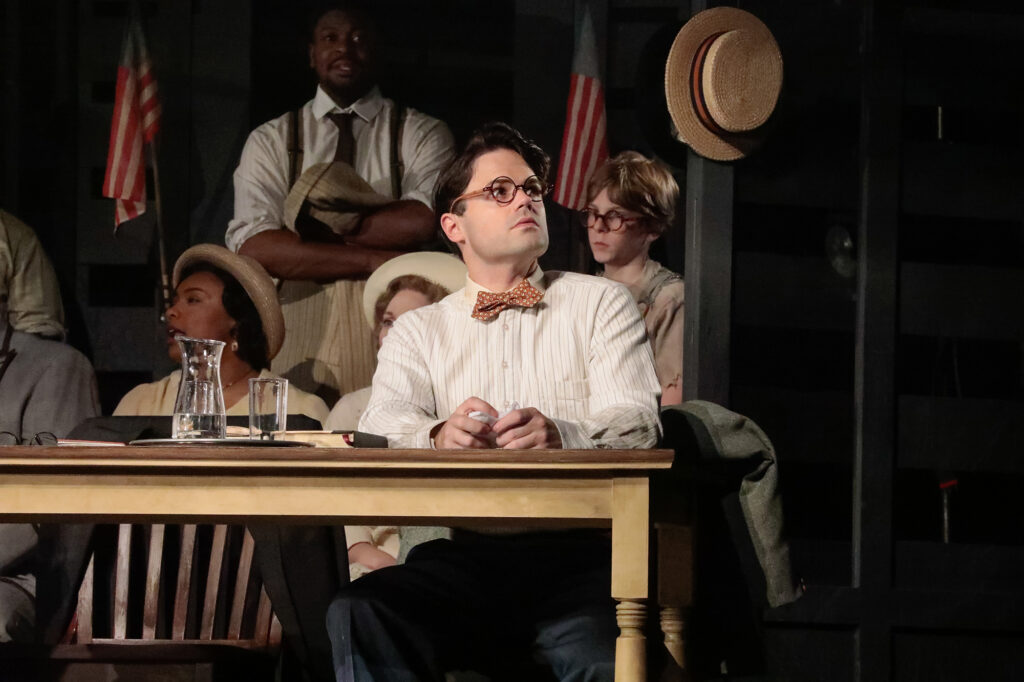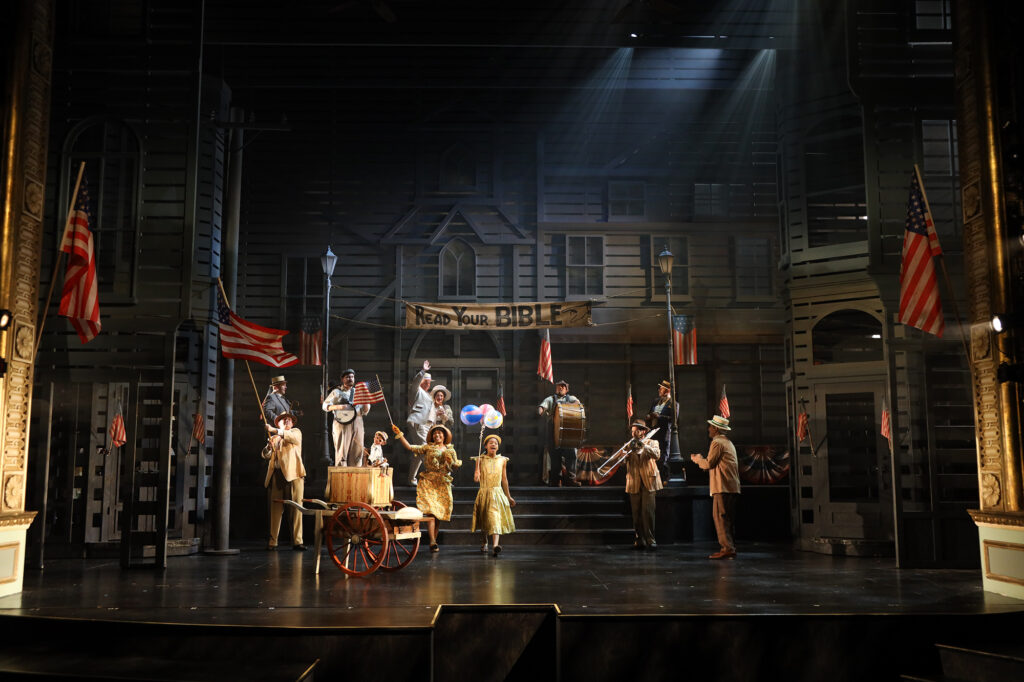
Feature
Retrial: Asolo Rep Stages Inherit the Wind
By Scott Ferguson | Photos by Sorcha Augustine | February 2024
First staged in 1955, Jerome Lawrence and Robert E. Lee’s Inherit the Wind is a fictionalized version of one of the most infamous trials in American history. Popularly known as the Scopes Monkey Trial, the 1925 case pitted legendary defense attorney Clarence Darrow against William Jennings Bryan, a firebrand lawyer, former secretary of state under President Wilson and three-time losing presidential candidate. Darrow represented John Scopes, a Dayton, Tennessee high school educator accused of teaching Charles Darwin’s theory of human evolution — which was forbidden by state law because it “denied the story of the Divine Creation of man as taught in the Bible.”
The play uses the actual trial as inspiration, but transforms Dayton into Hillsboro, Scopes into Bertram Cates, Darrow into Henry Drummond, and Bryan into Matthew Harrison Brady. Like Arthur Miller’s 1953 play The Crucible, set during the Salem witch trials of the 1690s, Inherit the Wind uses history to magnify the close-mindedness and fear-mongering of the 1950s — an era when screenwriters were blacklisted for their political beliefs and Wisconsin Senator Joseph McCarthy repeatedly alleged that communists had infiltrated the federal government, including the U.S. Army.
Peter Rothstein, Asolo Rep’s new producing artistic director and the director of Inherit the Wind, says it’s one of his favorite plays.
“What I love about it is that it speaks to the question, is censorship propelled by fear? I think fear is what keeps us small. I think asking you to expand your knowledge of the people whose lives and beliefs are different than yours doesn’t make your life any smaller or less important. And I think that’s at the heart of Inherit the Wind.”

Now — a century after the Scopes trial — when certain books are being removed from or restricted in public schools in several states, the words of the play’s defense attorney sound contemporary.
“Can’t you understand,” Drummond asks the jury, “that if you take a law like evolution and you make it a crime to teach it in the public schools, tomorrow you can make it a crime to teach it in the private schools? And tomorrow you may make it a crime to read about it. And soon you may ban books and newspapers.”
The script calls for protestors outside the courthouse to carry banners with messages like “Amend the Constitution: Prohibit Darwin,” “My ancestors ain’t apes,” and “Don’t monkey with our schools.”
Rothstein says that “while Inherit the Wind is certainly looking with a critical eye at censorship and what we’re allowed and not allowed to teach in American education systems, there’s a much more nuanced conversation in that play about the media’s role inside that political discourse.”
One of the characters, E.L. Hornbeck, is a newspaperman from Baltimore (think acerbic atheist H.L. Mencken), sent to cover the trial. His cynicism about religion contrasts with the fundamentalism represented by Reverend Jeremiah Brown.
Mark Benninghoffen, who portrays Drummond in Asolo Rep’s production, says, “In modern times, Hornbeck he would be one of these 10 o’clock pundits who’s got it all figured out. He’s real snarky and super-polished. Newspapers were like the Fox News or CNN of the time. The paper came out four times a day, and radio was just starting. Hornbeck first says he’s a reporter, but later tells someone he’s no reporter, he’s a critic. And I think the point is that the media is shaping some of our thinking.”
The play constantly offers different points of view. As with today’s social media, audiences can choose what viewpoint to follow — or they can dig deeper and weigh the evidence and arguments to develop their own thoughts.
In the play, the judge tells Drummond that “the right to think is not on trial here.” Drummond responds, “With all respect to the bench, I hold that the right to think is very much on trial!”
Indeed, playwright Lawrence has said, “We used the teaching of evolution as a parable…it’s not about science versus religion. It’s about the right to think.”
Andrew Long, who plays Brady, says, “I think the play offers the compromise that science and religion both have a right to exist. And I think that’s a really healthy thing to get into the discourse when we’re so far apart, to find any way to move toward a healthy place.”

“Drummond has a line that’s essentially about being narrow-minded,” notes Benninghoffen. “He says it to Brady, who he discovers has not read On the Origin of Species. He asks how Brady can be so sure that the body of science systematized by Darwin is in any way irreconcilable with the spirit of the Book of Genesis? I think what he means by that is science may have systematized a lot of factual, evidentiary stuff, but somewhere in the middle of that is a bunch of chemicals and water turning into life. And that’s a miracle. You can call that whatever you want, but they might coexist rather nicely.”
In the play, defendant Cates explains to Rachel Brown, daughter of Reverend Brown, why he taught his class about the theory of evolution.
“I had the book in my hand, Hunter’s Civic Biology. I opened it up, and read my sophomore science class Chapter 17, Darwin’s Origin of Species. All it says is that man wasn’t just stuck here like a geranium in a flower pot; that living comes from a long miracle; it didn’t just happen in seven days.”
In the seven decades since its Broadway premiere, there have been thousands of productions of Inherit the Wind. Many audience members will have seen a stage production — perhaps Asolo Rep’s own 2002 version, or the 1960 movie starring Spencer Tracy as Drummond and Frederick March as Brady. But Long and Benninghoffen say audiences will delight in the differences in Asolo Rep’s new staging.
I think it’s a very fresh look at the play,” says Long. “Peter has cast Black actors as Reverend Brown, his family, and a lot of members of his congregation. Putting that aspect into the production and being as realistic as possible really makes you look at the play in a new way.”
To reinforce the setting and ease the transition between scenes, the production uses gospel music and other traditional Southern genres.

“Part of it is because of the spiritual element,” says Long. “In and around the reverend’s congregation there are hymns, and they often establish the mood of the scene. Almost all the transitions use music, so if people are moving furniture, they’re also singing and establishing where we are.”
Asolo Rep’s 2023-2024 season program describes the director’s approach to the play: “Rothstein, long celebrated for his heightened theatricality, plans a vibrant, bold, music-filled production that is as relevant as it was when the play was first written.”
Long describes the play as “really fair. It offers a compromise in a way when there are really two kind of drastically different arguments being made. And it constantly reminds us how we haven’t changed at all.”
Benninghoffen adds, “I think no matter which side you’re on, you’re going to see your side. You’re going to hear the arguments in favor of your narrative. Some people will walk out and say, ‘I told you I was right.’ And the guy in the balcony will be saying to his wife, ‘I told you, honey, we were absolutely right.’ And I think that’s really speaks to the power of the play.”
For more information and tickets to Inherit the Wind and other productions in Asolo Rep’s current season, visit AsoloRep.org or call the box office at 941-351-8000.



You must be logged in to post a comment Login